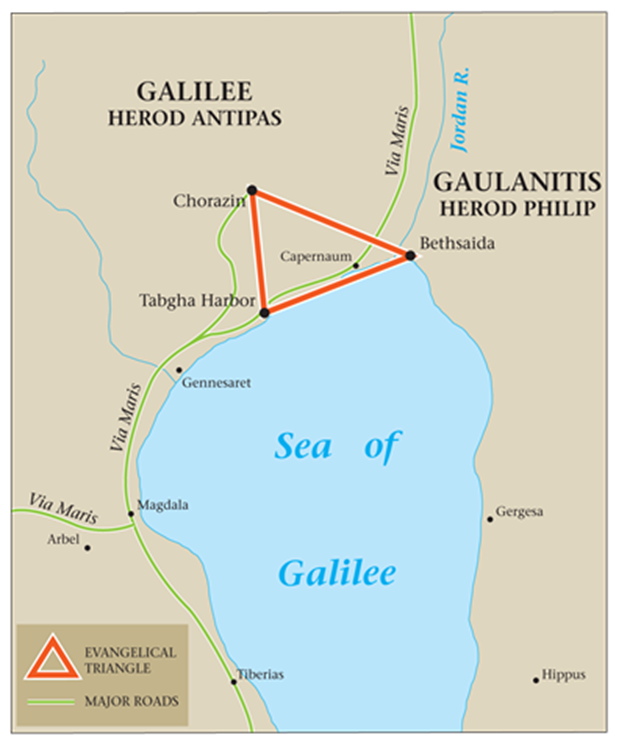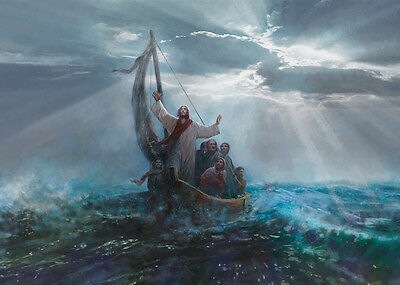

|
He returned to His city.
In the Name of the Father and of the Son and of the Holy Ghost. Amen. |
"He returned to His Own city."
Did St. Matthew say, "His city?" Now here is a subject with depth and scope. Where is this city mentioned without fanfare in St. Matthew's Gospel? Where or what could it be? It is not Bethlehem, the city of His birth, for that is 130 km south of the Sea of Tiberius (as it is called in the Rabbinic literature). It is not His boyhood home, Nazareth, for that is a small, landlocked village in the hill country of Galilee. Where then is "His city"?
Just previously, the Lord Jesus had been traveling in the land of the Gadarenes. This too is cloaked in mystery. At face value we must conclude that, in His tireless ministry to the "lost sheep of Israel (Mt 15:24)," He has journeyed to the Land of Gad, one of the lost tribes. Scriptural scholars and archaeologists today agree that this land seems an impossible country. To sum up generations of commentators: There are no cemeteries on the shores of the Sea of Tiberius. There are no tombs you could live in. There are no cliffs along the shores. The third century philosopher Porphyry of Tyre asked, What are swine doing in any village or city of Judea or of the Jewish Levant? Here is plainly set before us a mystery: the Son of God journeying to a lost land in search of a lost tribe. (Always remember Origen's dictum that the spiritual meaning of Scripture is its primary meaning.)
Just before departing on this mythic journey, a scribe approaches the Lord Jesus saying,
| "Teacher, I will follow you wherever you go." |
| "Foxes have holes, and birds of the air have nests; but the Son of man has nowhere to lay his head." (Mt 8:20) |
In the next verse another would-be follower draws near. Jesus tells him,
| "... leave the dead to bury their own dead" (Mt 8:22) |
The ones who do venture to follow Him into His "not-here, not-there, impossible-to-find" land enter a kind of "worm hole" and then behold things not for the faint-hearted:
|
And when He got into the boat, His disciples followed him. And behold,
there arose a great storm on the sea, so that the boat was being swamped by the waves; but he was asleep. And they went and woke him, saying, "Save, Lord; we are perishing." And He said to them, "Why are you afraid, O men of little faith?" Then He rose and rebuked the winds and the sea and there was a great calm. And the men marveled, saying, "What sort of man is this, that even winds and sea obey him?" (Mt 8:23-27) |
Soon after this, they are plunged into a scene of violence and mania where ferocious men live amongst the dead in tombs, who is turn are a habitation for demons. They watch a demon-possessed herd of many swine leap from a cliff into the sea ... a scene so overbrimming with otherworldly energy and content that people living in the region cannot stand it anymore and "begged Him to leave their neighborhood" (Mt 8:27).
It is from here that the Lord of the winds and the seas,
the Lord of lost geographies and lost tribes,
the Lord of demons and the underworld,
departs to return to "His city."
In the next verse,

| And getting into a boat He crossed over and came to His own city. (Mt 9:1) |
A few miles to the east lay Bethsaida (meaning "House of Hunting or Fishing"), where Jesus sought out and called His first Disciples, Andrew, Peter, John, and James, who would become His inner circle. To Philip of Bethaida and to Nathaniel, He said,
|
"Because I said to you, I saw you under the fig tree, do you believe?
You shall see greater things than these." And He said to him, "Truly, truly, I say to you, you will see Heaven opened, and the angels of God ascending and descending upon the Son of man." (Jn 1:50-51) |
As "living water" carries a primary meaning throughout the Gospels and to Christians today, we pause in reverence to single out a remarkable fact: the Sea of Galilee is the lowest fresh water lake on earth. Understanding true lakes to be fed by springs, it is therefore the first instance of living water on the face of the earth. And today we note that the First-born of Creation has chosen it for the scene of His ministry and Self-revelation. The cold, bubbling headwaters of the Jordan are just to the north, where Jesus sat His disciples down and asked the great and crucial question that we all must answer, "Who do you say that I Am?"
The lake itself is a kind of navel of the world with life teeming in it and around it. Running southward continues the Jordan, where St. John the Forerunner enacted a kind of tsunami of rebirth through its most holy waters. Significantly, the Jordan completes its journey trickling into the receding waters of the Dead Sea. In and of itself, that is, the Jordan represents the transit from life to death with all its bright possibilities for divine transformation in living waters or, if we reject these, to an eternal conclusion in the silence of stagnant death.
Here is the oculus. And here God chose to set aside a place to reveal Himself and His purposes as He had never done before in human history, dwelling among humans as a human, fully man, fully God. What, then, is the name of "His own city?" This remarkable place! It is Capernaum, which in Hebrew means "Village of Nahum." In that sense, it is an ancestral home for Jesus. In Luke's genealogy we learn that the Most Holy Mother of God descends from Nahum. Like Bethlehem, then, the City of David, Capernaum is named for one of Jesus' "great-grandfathers."
The name of the prophet, Nahum, means "comforter," but his is a strange sort of comfort, for it is defined in terms of the awesome power of God in the destruction of the ungodly:
|
His way is in whirlwind and storm,
and the clouds are the dust of his feet. He rebukes the sea and makes it dry, he dries up all the rivers; Bashan and Carmel wither, the bloom of Lebanon fades. The mountains quake before him, the hills melt; the earth is laid waste before him, the world and all that dwell therein. (Nahum 1:3-5) |
Remarkably, Jesus returns to the City of Nahum just after revealing precisely these powers, acquitting Himself of an unmistakable family resemblance, and, therefore, of an imperial, and more-than-imperial, authority and identity.
In our Epistle lesson this morning, St. Paul issues an injunction,
| ... bless and do not curse ... (Rom 12:14) |
| "cursed ... above all cattle, and above all wild animals." (Gen 3:14) |
|
to Adam He said, "Because you have listened to the voice of your wife,
and have eaten of the tree ... cursed is the ground because of you ..." (Gen 3:17) |
We want only to see and know a life under blessing. And this God freely grants in the bonds of our love with Him. For what is spiritual life but being close to God? We pray. We converse with Him throughout the day chiefly in seeing the blessings around us and giving thanks for them. We strive to emulate our great Master and Exemplar in the living of our lives. Perhaps most exciting, we see that our own lives are fraught with meaning like a work of literature. As these holy narratives unfold, we discover allegories and learnings and fulfillment, all under the blessing of God.
Love is uniquely the safe place where one might draw near to awesome power. In our own experience we see a wife or son or daughter of a man wielding stupendous power living in this special place. To them he is "Darling" .... or "Daddy." Yes, great power inherently is linked to great danger, but it will not come near to them. And whose love is safer and more trustworthy than God's?
Nonetheless, we are not puppets, nor is God a puppet master. We are free to abandon His love. We are free to curse His celestial House of Life overturning His rules for living. As in any love relationship it lies within our power to abuse His love, even to hurt Him in His human dimension. In the furthest extreme we are free to mock Him, to spit upon Him, and to murder Him. And He is equally free to cry out in His human voice:
|
"Woe to you, Chora'zin! woe to you, Beth-sa'ida! for if the mighty works
done in you had been done in Tyre and Sidon, they would have repented long ago in sackcloth and ashes. (Mt 11:21) |
|
And you, Caper'na-um, will you be exalted to Heaven? You shall be brought down
to Hades. For if the mighty works done in you had been done in Sodom, it would have remained until this day. (Mt 11:23) |
Jesus returns to His own city. And immediately, He heals a paralytic. Just as immediately, He is faulted, even accused. And He calls His accusers into account. To the crowd, He reveals His divinity:
| "that you may know that the Son of man has authority of earth to forgive sins ..." |
|
... he then said to the paralytic — "Rise, take up your bed and go home."
And he rose and went home. When the crowds saw it, they were afraid, and they glorified God, who had given such authority to men. |
As we go about our lives in His sight, we must always hold close a reverence for His awesome power. He is greater that all we can see or know. As C.S. Lewis commented remembering His birth, once something larger than the universe was contained inside a tiny manger. Yet, He departed from the courts of Heaven that He might dwell with us. Let us abide in His love.
I conclude this morning with words from the poet, Christina Rossetti.
|
Our God, Heaven cannot hold Him
Nor earth sustain, Heaven and earth shall flee away When He comes to reign: In the bleak mid-winter A stable-place sufficed The Lord God Almighty — Jesus Christ. |